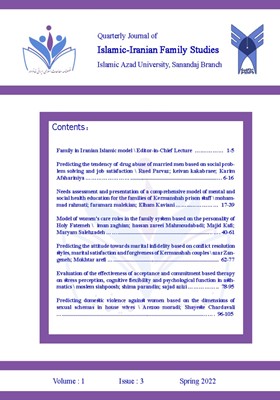Comparing the effectiveness of metacognitive therapy and behavioral activation therapy on cognitive-emotional regulation in women with dysthymic disorder
Subject Areas : Islamic-Iranian Family Studies Journal
Majid Jamehbozorgi
1
![]() ,
Seyyed ali Aleyasin
2
*
,
hasan heidari
3
,
Hossein Davoodi
4
,
Seyyed ali Aleyasin
2
*
,
hasan heidari
3
,
Hossein Davoodi
4
![]()
1 - Ph.D. student in General Psychology, Department of psychology, faculty of humanities, Khomein branch, Islamic Azad University, Khomein, Iran
2 - Assistant professor, Department of clinical psychology, Faculty of Humanities, Ashtian Branch, Islamic Azad University, Ashtian, Iran
3 - Associate professor, Department of counseling and psychology, faculty of humanities, Khomein branch, Islamic Azad University, Khomein, Iran
4 - Assistant professor, Department of counseling and psychology, faculty of humanities, Khomein branch, Islamic Azad University, Khomein, Iran
Keywords: Behavioral Activation Therapy, Cognitive-Emotional Regulation, Dysthymic Disorder, metacognitive therapy,
Abstract :
Aim: The present study aimed to compare the effectiveness of metacognitive therapy and behavioral activation therapy on reducing negative emotional regulation and increasing positive emotional regulation in female patients with dysthymic disorder. Method: The present study was a semi-experimental one with a pre-test-post-test-follow-up design with a control group. The statistical population of this research included all patients with dysthymic disorder who attended the psychological clinics located in the 8th district of Tehran, 45 of whom were selected in a purposeful way and randomly assigned to two experimental groups and one control group. The instrument of this research was the cognitive-emotional regulation questionnaire of Garnefski et al. (2002) with the validity of 0.73 to 0.88. For the first experimental group, metacognitive therapy (Wells, 2009) and for the second experimental group behavioral activation therapy (Dimidjian et al., 2008) were held in eight 90-minute sessions, but the control group did not receive any intervention. The data were analyzed using mixed variance analysis and Benferroni in SPSS-26 software. Results: The results indicated that metacognitive therapy and behavioral activation therapy reduced cognitive-emotional regulation and its components at the end of the interventions and the follow-up period (p>0.05). Also, behavioral activation therapy is more effective than metacognitive therapy in reducing emotional cognitive regulation symptoms (p>0.05). Conclusions: Due to the effect of behavioral activation therapy on depression, it can be effective alone or with complementary therapy in reducing cognitive-emotional regulation and depressive symptoms in patients with dysthymic disorder.
_||_

